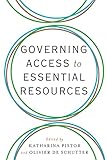Governing Access to Essential Resources / ed. by Olivier De Schutter, Katharina Pistor.
Material type: TextPublisher: New York, NY : Columbia University Press, [2015]Copyright date: 2015Description: 1 online resource (392 p.) : 14 figures and tablesContent type:
TextPublisher: New York, NY : Columbia University Press, [2015]Copyright date: 2015Description: 1 online resource (392 p.) : 14 figures and tablesContent type: - 9780231172783
- 9780231540766
- 363.7 23
- GE170 .G675 2016
- online - DeGruyter
| Item type | Current library | Call number | URL | Status | Notes | Barcode | |
|---|---|---|---|---|---|---|---|
 eBook
eBook
|
Biblioteca "Angelicum" Pont. Univ. S.Tommaso d'Aquino Nuvola online | online - DeGruyter (Browse shelf(Opens below)) | Online access | Not for loan (Accesso limitato) | Accesso per gli utenti autorizzati / Access for authorized users | (dgr)9780231540766 |
Frontmatter -- CONTENTS -- Introduction -- 2. Land’s Essentiality and Land Governance -- 3. Governing Boundaries -- 4. Property Theory, Essential Resources, and the Global Land Rush -- 5. MultipliCity -- 6. Voice, Reflexivity, and Say -- 7. Tenure Security and Exclusion Processes in Peri-urban Areas and Rural Hinterlands of West African Cities -- 8. Redirecting Regulation? -- 9. Erosion of Essential Resources in Neoliberal India -- 10. Comparing Water Access Regimes Under Conditions of Scarcity -- 11. Go with the Flow -- 12. Ecology -- 13. Water Scarcity in Morocco -- 14. Solving Transborder Water Issues in Changing Climate Scenarios of South Asia -- 15. Voice and Reflexivity in Essential Resources -- 16. Do Traditional Institutions Matter in Participatory Essential Resource Governance Systems in Zimbabwe? -- 17. Local Corporationss -- Epilogue -- Contributors -- Index
restricted access online access with authorization star
http://purl.org/coar/access_right/c_16ec
Essential resources do more than satisfy people's needs. They ensure a dignified existence. Since the competition for essential resources, particularly fresh water and arable land, is increasing and standard legal institutions, such as property rights and national border controls, are strangling access to resources for some while delivering prosperity to others, many are searching for ways to ensure their fair distribution.This book argues that the division of essential resources ought to be governed by a combination of Voice and Reflexivity. Voice is the ability of social groups to choose the rules by which they are governed. Reflexivity is the opportunity to question one's own preferences in light of competing claims and to accommodate them in a collective learning process. Having investigated the allocation of essential resources in places as varied as Cambodia, China, India, Kenya, Laos, Morocco, Nepal, the arid American West, and peri-urban areas in West Africa, the contributors to this volume largely concur with the viability of this policy and normative framework. Drawing on their expertise in law, environmental studies, anthropology, history, political science, and economics, they weigh the potential of Voice and Reflexivity against such alternatives as pricing mechanisms, property rights, common resource management, political might, or brute force.
Mode of access: Internet via World Wide Web.
In English.
Description based on online resource; title from PDF title page (publisher's Web site, viewed 20. Nov 2024)


